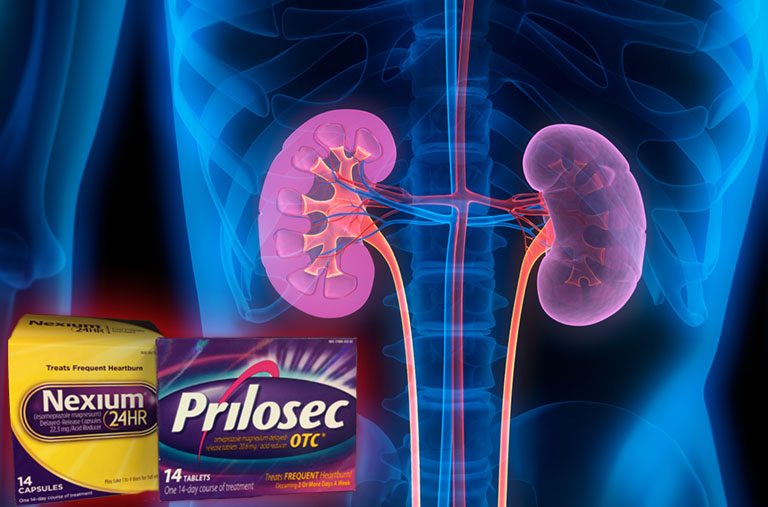Popular heart burn medications Prilosec and Nexium were both linked to kidney problems in several recent studies. The most recent study found that patients who took heart burn medications such as Prilosec and Nexium have a 96 percent increased risk of developing kidney failure. Patients who took heart burn medications in this class were also found to have a 28 percent increased risk of developing chronic kidney disease.

Nexium and Prilosec are in a class of heart burn medications known as proton pump inhibitors (PPIs). Proton pump inhibitors are prescribed to treat heart burn, ulcers, and acid reflux. About 15 million Americans have been prescribed a heart burn drug like Prilosec and Nexium. However, there are also over-the-counter versions of these heart burn medications so the total number of people who have taken these drugs is unknown. A study published in the Journal of the American Society of Nephrology on April 14 discovered a large share of patients taking proton pump inhibitors, including Prilosec and Nexus who were developing kidney problems. Specifically, the patients taking PPIs had a 96 percent greater probability of developing kidney failure as well as a 28 percent greater risk of developing chronic kidney disease, when compared with patients who took other types of heart burn medications known as histamine H2 receptor blockers.
Call a PPI Kidney Failure Lawyer Who Will Fight For Your Rights
This is not the first study to show a link between Prilosec and Nexium and kidney problems. The Journal of the American Medical Association (JAMA) published a study in February 2016 showing a link between PPIs and chronic kidney disease. That study was performed after other research showed a link between PPIs and acute interstitial nephritis, a condition which is known to lead to kidney failure. In late 2014, the Food and Drug Administration (FDA) approved a label change for Nexium to include acute interstitial nephritis as a possible Nexium side effect.
Symptoms of kidney failure that Nexium and Prilosec patients should be aware of:
- Anemia
- Weak bones
- Bleeding in the stomach and intestines
- Changes in blood sugar
- Nerve damage in limbs
- High blood pressure, heart attack or heart failure
- Liver damage
- Increased risk of infections
- Stroke
- Seizure
Patients taking PPI’s including Nexium, Prilosec and Prevacid – often prescribed for heartburn, indigestion or acid reflux — are at a significant increased risk of developing acute and chronic kidney disease.
Contact the Law Offices of Chhabra & Gibbs Today
If you have experienced any complications by one of these heartburn medicines (PPI), you may qualify to file a claim. PPI’s are widely thought to be over-prescribed and the large volume of annual prescriptions support a multi-billion dollar industry and, unfortunately, are often given to patients to address conditions that can be readily treated with over the counter antacids. This ultimately leads to devastating, sometimes life-ending, side effects. Kidney damage is one such effect that is now definitively tied to proton pump inhibitors.

